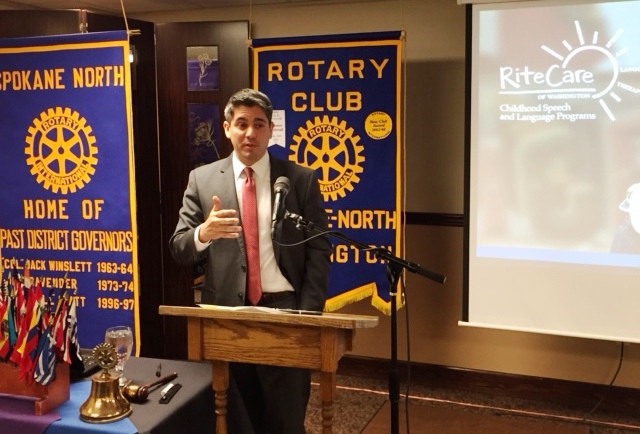RiteCare - John Rivera
Posted by Charles Rehberg
on Jan 26, 2016
Spokane North Notes
A weekly bulletin of the Spokane-North Rotary Club
January 25, 2016
Editors: Chuck Rehberg and Sandy Fink
Photo: Jim Minkler
Program coordinator: Brad Stark
Science night: The club’s annual science night for Holmes Elementary will be Feb. 18 at the school, said coordinator Melinda Keberle. As it did last year, the Mobius Science Center will take its display units to the school for a hands-on experience for Holmes students and their families. The science center, formerly housed in the old downtown J.C. Penney and Burlington Coat building, continues its move to facilities donated by Avista, just north of City Hall.
RYLA search: Administrators at North Central High are considering candidates for a club-sponsored appointment to the Rotary Youth Leadership Academy, said project contact Chris Lynch.
Group membership?: As the club seeks to increase membership as well as participation from schools in its project area, Chris Lynch also said NC Principal Steve Fisk is considering enrolling as a club member with the understanding that club lunch attendance would be rotated among NC administrators and faculty. The shared membership was an idea voiced during a Jan. 4 meeting on how to boost club participation.
Therapy program helps kids communicate
Some may still think “talk is cheap” – except perhaps for TV ads for political campaigns or the Super Bowl.
But being able to talk, and communicate competently, can be priceless.
Enter the Scottish Rite Masons, whose RiteCare programs target speech disorders in children ages 2 to 7 who may “produce sounds incorrectly, delete words or put words in the wrong order.”
 John Rivera, development director for RiteCare in eastern Washington, described the program at the club’s Jan. 25 luncheon.
John Rivera, development director for RiteCare in eastern Washington, described the program at the club’s Jan. 25 luncheon. The speech therapy program – free to participants, regardless of income or insurance coverage – was started in Denver in 1953 by a Mason seeking help for his granddaughter. The nation-wide program now serves some 28,500 children each year at 170 treatment centers, including 50 free-standing clinics. RiteCare of Washington has free-standing clinics in Seattle and Spokane and offers selected services at other clinics in Tacoma, Everett, Vancouver, Olympia, Kennewick and Yakima.
Rivera said the Spokane branch recently relocated from the Masonic Temple on Riverside to the Holley Mason Building, 157 S. Howard. Clinic director Kerri Baldwin has been with RiteCare 10 years. Rivera joined the program a year ago, following several years with the Boy Scouts.
“I had a speech problem as a kid, but now it’s gone,” Rivera said, adding, “I was able to yell at people in the Army (he was in the infantry) and can do fund-raising.”
Rivera said about 7 percent of young children suffer from speech and language delays severe enough to affect routine life functions. Genetics and heredity often play a role in the speech disorders, he said.
The program offers what Rivera calls “child-centered, family-focused and need-driven intensive therapy.” Some 200 children are in the program in Washington and 4,000 have been enrolled since 1984.
Program referrals come from pediatricians, schools, Masonic contacts and programs such as the Shriners’ Hospital, Guilds School and Vanessa Behan Crisis Clinic. Rivera said the program collaborates with schools and other treatment outlets, but offers
directly speech therapy, without the distractions other organizations may encounter, “for as long as necessary.”
“RiteCare’s therapy model is different from other places,” Rivera said. “It’s a play-based therapy which engages children’s natural curiosities. Kids just want to have fun.”
The therapy, he adds, “works well on 3 or 4 year olds; not so well on 40-year-olds.”
Funding comes from Masonic bequests, donations and events such as the annual Beyond Words Breakfast, which this year is May 19 at the Spokane Convention Center.
